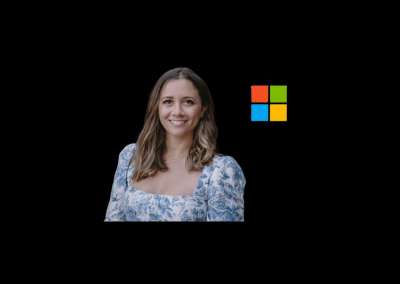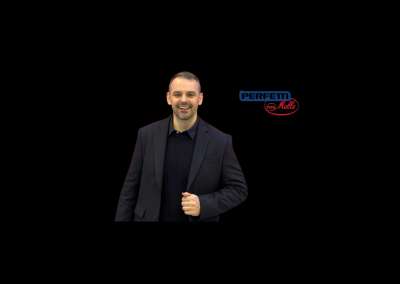Shiny New Object Podcast - Episode 323
Marketing magic is made when you treat data like a creative brief, not just a number - look for the story behind the numbers and what it's telling you about the audience.
For Nick Cedar, Manager, Media Strategy and Planning at SharkNinja, it is essential that marketers go beyond simple data and really work to understand their audiences before all else. Metrics are clues to emotions and human drivers and we are selling to human beings after all. So don't be afraid to ask questions, look beyond obvious immediate data points, and build data stories that inform the creative.
On the podcast, Nick shares how to find the human in the numbers and make data creative friendly. Tune in to learn more.
Transcript
The following gives you a good idea of what was said, but it’s not 100% accurate.
Nick Cedar 0:00
You know, at the end of the day, we are humans, and that's what we're supposed to be selling for. Like you need to understand how humans think take the me out of media.
Speaker 0:13
Are you a fitness loving foodie? Then defy snacks is for you. Defy offers real high quality chocolate you love, combined with functional ingredients, giving you as much as 26 grammes of protein per bag. So you can be both a little bit bad and a little bit good at the same time as a female owned brand, defy dedicates a portion of its profits to other women owned businesses currently sold in the US. You can find us on defy with an i snacks.com and follow us on social at defy snacks.
Tom Ollerton 0:46
Hello and welcome to the shiny new object podcast. My name is Tom Ollerton. I'm the founder of automated creative, the creative effectiveness ad tech platform, and this is a weekly podcast about the future of data driven marketing. Every week or so I have the pleasure and the privilege of interviewing one of our industry's leaders about the future of the data marketing industry, and this week is no different. I'm on a call with Nick cedar. Am I? Am I saying that right Nick?
Nick Cedar 1:10
Yes. Nick cedar, like the tree.
Tom Ollerton 1:12
Nick cedar, like the tree. Who is manager, media strategy and planning at sharp ninja. So Nick, for anyone who doesn't know who you are and what you do. Could you give us a quick background?
Nick Cedar 1:23
Yeah, so I oversee media, all the all paid media with Shark ninja in Canada. So we are I'm in charge of everything, all the ads you see, the strategy behind it, you know, really making sure that we're real shark Ninja is being heard in the Canadian market.
Tom Ollerton 1:45
Fantastic, right? So let's jump into it, right? I always give everyone a list of 10 questions, and you've chosen the weird one. I love this, right? So the weird one is, how would you want people to remember
Nick Cedar 1:56
your career? Yeah, you know, I don't find this one to be a weird one, because,
Tom Ollerton 2:00
sorry, it's the weird one out of the questions,
Nick Cedar 2:03
yeah, for me, you know what I want to be remembered as, is I came, I always came to the table with something compelling and a story, and I was able to lead through the lens of humanity. You know, I was very fortunate to be, to be brought into this industry and taken under the wing of some some big names in Canada. And, you know, to me, I think I owe it to the industry to pass that on. So I always want to be remembered as someone who's always thought outside the box. And, you know, was a true leader to to the up and comers in his industry. That is a
Tom Ollerton 2:37
beautiful way to start the podcast, because I've still got the horrible imposter syndrome that I shouldn't be here, like the idea that I would take someone under my wing, I think, Oh, poor thing. But you find the time and the spirit to do that. How do you how do you justify taking someone under your wing? It doesn't necessarily work for the organisation.
Nick Cedar 2:55
Well, I mean, you always got to be careful with sensitivities. But I mean, as an industry as a whole, I'm very comfortable taking anybody under my wing and mentoring, you know, even just a quick chit chat, hey, I've got some questions. Can we, can we talk and talk about the industry how? You know, I really love when people reach down on LinkedIn and they're like, how did you break in, and what is some advice you have? And so I'm very open to
Tom Ollerton 3:19
it. And do you do you find yourself like, do you have like, lots of mentees, or is it like you have a couple of people that you look after specifically
Nick Cedar 3:27
everywhere I go, I always make sure who was ever under me, under my team, my entire team is under my wing. I always, you know, for me, me doing a good job means my team is excelling and growing, not just necessarily what I've done as a leader, because to me, my true success as a leader is my team was able to figure out the solution and my team, I was able to rally my team to get the
Tom Ollerton 3:51
job done, not tell them what to do exactly for me. So what I'm looking for now is your best bit of data driven marketing advice. So when you are when you do have this little under your wing, and they're finding or the solution for themselves, and you're bringing something compelling to the table, what is that one bit of data driven marketing advice that you find yourself sharing most often,
Nick Cedar 4:13
no matter what idea you bring to the table, always play devil's advocate. That's number one, even, even if I think my idea is the best out there. You always got to think of every angle, anything that can pop up. And I also think too, you know, I always say, don't just collect data, you know, translate into something that creative, creative teams can actually use to help solve your problem. You know, if you're in, if your insights can't be explained in like one sticky sentence, then it's not a true insight. I think you need to, you know, data should be a launch pad for ideas, and not just a scorecard store, like a scorecard of what's
Tom Ollerton 4:52
happening. I interviews a lady called curler bloom, who was she was a EA sport Expedia. Now. And she said something to me, this has really changed the path of automated creative is that she said that unless your data is presented in a way that it inspires a creative idea, it's it's failed, you cannot present the dashboards. You cannot present a list of bullet points, because no creatives can go yes and that, you know, that's what we really try and do as a business. Yes, of course, we've data and dashboards and decks, but we always like to tell that as much of a story so someone can really go. Are you kidding me, right? Okay, well, let's go and do this thing. Inspiration is what we're after, not just dashboards
Nick Cedar 5:34
Exactly. And I think I feel we got really lost into those quick, quick, you know, quick connections of, hey, we need to change this now before going after trends, really diving into the data, because we can get data that shows us, Hey, this is what's happening right now, and we're going to pivot. But how do we know that that pivot is actually correct, if we're real time right now going hardcore without focusing on what the trend is and how you know, how can we return this, this data and everything coming at us into actual actions based on a trend, and not just what you're seeing right hand, right, right, right where you know, knee jerk reactions.
Tom Ollerton 6:20
So we're going to now talk about your shiny new objects. And your shiny new object is audience centric, data storytelling, so I think I know what that is. But can you explain that? What is it and why have you chosen it as your shiny new object?
Nick Cedar 6:38
Yeah. I mean, you know, in marketing, we've never had more data than we do now. And you know, at the same time, we've got so much data we were we've become even more confused by it. And it's often data is used like a report card. We look at it, you know, after a campaign ends, well, we got an A here, c minus there. What's next? But there's no, that's not where the magic really, really sits. You know, the mad the magic's where, when you treat data like a creative brief, not just what's the number, but what's the story this number is telling us about the audience. So like when I worked on a campaign where, you know, all our top line metrics were looking great, click through, rates were okay. You know, engagement was great, but still something felt off. We weren't getting total conversion. We're getting engagement, but conversion wasn't there. So we dug into the search queries, and, you know, we looked at the social chatter, which is very, I am a big fan of looking the social chatter. You know, everyone's got an opinion. It's out on our Tom, out on our our socials. Let's look at them and use them to our benefit, because these are what people are saying, you know. So what we did is when we we found that people were responding to a different benefit than what we were actually leading with, and we saw this trend week over week happening. So we flipped the creative make campaign to match exactly what they cared about. And then, you know, suddenly the campaign wasn't just performing better. People were starting to talk about it. People were sharing it, people, you know, becoming more viral, more socially accepted. Just because we saw that trend, we focused on it, and we've turned it into an action, you know, versus if we just looked at the numbers, we would have just been staying course, because it looks like everything's going strong
Tom Ollerton 8:25
and so so essentially, what I haven't got a good name for this, but one of the things that I've found in my research is that it's easy to go for all of the easy data, stuff that just comes down the pipe, but it's The data that is harder to find that. It's richer, right? You know, like you, what you could have done is you could have, I don't know, gone into people's homes and observed them using the range, but we've done the step in between, which is social listening, right? You know, you're you just either manually or someone automated that report, and you're like, Ah, they're talking about that. But, yeah, you don't get that unless you're curious. You don't get that unless you prepare the unless you're prepared to go the extra yard. If you don't try, if you don't look beyond the dashboard, then you're not going to get it.
Nick Cedar 9:09
Well, for me, it comes down to three things. Find the human in the numbers, because at the end of the day, metrics are clues to the emotions. But we're not selling to computers. We're selling to human beings. Yes, you know, make the data, like I said earlier, creative, friendly. So if it can't be summed up in one tricky thing, so that we can go back to this one sticky sentence to it won't expire, that, that great work, you know that can we
Tom Ollerton 9:39
mind? Because there's such an important point for me. Point for me, can we get into the how you do that, right? So you've got your your Excel with all your data in it, you turn that into a dashboard. You work out, oh, right, okay, it's this. And then you've got to get in a room with a creative who doesn't care about any of that stuff, and you talk about that one sticky idea that. Inspires a creative thought or action. How do you do that? You're an analytical person, but you need to talk to a creative person. How do you
Nick Cedar 10:09
so the way you describe that, it sounds so siloed. I got to go talk to a creative person. My creative person has been in the room this conversation this entire time, and we're working it out together, and I'm bringing up insights. And I go, Hey, creatively, here's what I found. I found this, this and this, but what I'm looking at is, I think this is this. What's your opinion from a creative mind? And I've broken down that silo, and we work together on it. I believe in a full funnel approach to media. I believe in all our marketing communications should be un siloed, and our entire plan should be working together. And creative people may not care about that those metrics, so we don't speak to them in those type of metrics. You just get down to the juicy opinion. Hey, this is suck in. Here is where we're finding in media and metrics. What are you finding? And work together as a team to come up with that creative solution.
Tom Ollerton 11:02
This episode of the shiny new object podcast is brought to you in partnership with Mad fest, whether it's live in London or streamed online to the global marketing community, you can always expect a distinctive and daring blend of fast paced content, startup innovation pitches and unconventional entertainment from Mad fest events, you'll find me causing trouble on stage, recording live versions of this podcast and sharing a beer with the nicest and most influential people in marketing. Check it out at www dot madfest london.com,
Tom Ollerton 11:39
so what's your advice for someone who's listening to this podcast and they're thinking, yeah, audience centric, data storytelling, yeah, I'm totally on board with Nick, but we don't do it in our organisation. How do you set
Nick Cedar 11:52
it up? Don't do it's just your first hurdle, and you need to bring it up and build the business case as to why you should. You know the business take the initiative to say, hey, I have a potential unlock here. I'm going to come to the businesses, why it matters to the business, and what we can unlock, and how, how this can open up communication. And then really, you need to build the point if you're not doing it, and you need to believe in it as well. If you're going to sell it, it's, it's what I believe. Some people might have different opinion, but I believe in in the unsolved approach. And you know, when we work together as a team, and everybody's at the table, at least representative, you don't want to have too many cooks, but representative of each metrics, and you guys are working together, your campaigns are going to flow a lot better, and there's going to be a lot less apps. And you know, you take accountability as a team, not just a single, single function. But to me, it'd be, if you, if you believe that as well, then take it back to your business and prove your case as to why and
Tom Ollerton 12:50
how do you prove that case? Right? Obviously, I'm on board. You don't need to convert me. But do you have a siloed business? Right? You know, you've got, there's a there's a head of creative or creative director over there, then there's a head of media over here, and there's analytics and insights person over there, and whoever else in between. But if you've not done that before, what is the business case? Because you're very passionate about it, but numerically, how would you love the way you phrase it? You say, I think I've spotted an unlock, and that's very powerful language. It's a great story in its own right, but I've spotted an unlock, and here's my data point. But how, how could people arm themselves?
Nick Cedar 13:27
I would say you need to look at one where the the you were losing, or your conversion, and where it's not working. Or, you know, take deep dive in the data you do have, and then take it to to where you like, say the unlocker. We're finding, we're getting low engagement on our create Okay, then I'm going to go talk to the creative manager. Here's what I'm finding. And I think there's a bigger, bigger business case. Let's get out of the heads at the table that we can talk to and really start, you know, gathering your information of how, you know, develop a case study for it. There's no real right way at the beginning to start it. I think you just have to start it. It's you. You have to take that initiative to say, Hey, this is what I'm seeing in the data I have right now. If we work together on this project, I see this, and then I could see that maybe, based on this, if we had changed, if our response to say we're going to change up to creative, I anticipate that we're going to have this much higher, you know, we're going to improve this much on our click through rates, or, you know, our conversion, you know, really coming in with numbers you can control, and then really coming to the table afterwards and doing a follow up after you've done it. So you need to prove to the business, once you get them sold in that, you know, I have developed a framework to come back to the business to tell you how much more this is unlocked when we run we're able to unlock these silos.
Tom Ollerton 14:53
And what's the future of this space? Do you think so you've got this mixed skill set and. Representatives all sat on the table. They're the people we've discussed. And you're pulling in performance data from your campaigns, your behaviour on website, CRM, retailer and so on. And you're pulling it all together, and you're creating a story, and you're getting the creative point of view you're up in my experience of certainly running automated creative that you that is rare to have that, that that's not common, but because you are ahead of the pack in that sense, what, what does even more excellence look like? Where could this go? Is there like an AI version, where you lot of this happens automatically, and what you're doing is spending more time doing the hard to find data, research, the interviews that quote,
Nick Cedar 15:44
well, I mean, there will be an element AI, of course, always as that comes and develops, but I think we can, you can't get lost in the human connection, in the human brainstorms and human gut feeling that you'll never find in any data we have. So bringing that conversation to the table. AI is going to help enable us to provide better and stronger debt, in case, you know, cases to bring back to the business, but I think you need to continue to still bring everyone to the table. Have an honest discussion. No table, you know, unlock those are silos, and bring it all together as one, will that get more efficient than it is now, yes, 100%
Tom Ollerton 16:33
and so I think it's really at your point there about, you know, really, really being able to listen outside of the data, like, are there, are there other non sort of tech skill sets that you think people should learn? Like, obviously, listening is a huge way of doing it, but there's, there's active listening, there's, you know, listening through having an involved discussion or just being passive. Like, do you find there's other social skills that an important asset that you've seen within your teams,
Nick Cedar 17:01
to be honest, I think you you need to, you need to, you need you know, at the end of the day, we are humans, and that's what we're supposed to be selling for. Like I said earlier, right? So you need to understand how humans think and get yourself take the me out of out of media. We'll say, Oh, Nick I've never heard that. You have to you that's a comment, yeah, that would take the media. And you know who your target is really? You need to understand who and what they're like, what they live, breathe in. You know, we get worse. We've all this data. But who's to say that people aren't just randomly searching for random things, because we've got so many avenues to be searching for. Is that really a true, true passion point, and then we're going after somebody hard on retargeting, but really, all we're doing is annoying them and not giving them a good brain experience, right? So I think we need to really understand who, if we have created these targets, who and how they really shop, and not just based on some some numbers like you really need to psychologically think, like getting to the heads of who they are, and that's how you be a strong marketer. And you combine that with your data that you're getting. There's always a gut feeling it's hard to explain, and until you're really in in the industry, that there's a gut feeling that grows as you with your experience, and in that you know, data will help it, but there's always going to be that gut you need to follow as well.
Tom Ollerton 18:25
Nick, unfortunately, really, I've run out of time. I feel we could talk about this for a very long time, and I really appreciate you sharing your experience, and a lot of that really chimes with mine. If someone wants to get in touch with you, where is the best place to do that and what makes a message that you'll respond to.
Nick Cedar 18:41
Yeah, LinkedIn. And you know, honestly, any messages, I check all my messages. So what if you want to talk? Say hi, you heard this, or you want to talk more about what I've discussed today, or you've gone to challenge, we want to have a little bit of a conversation on it. I'm open to that as well. LinkedIn would be the best app anymore. Nick, thank you so much for your time. Thank you.
What Next?
Subscribe to our YouTube channel
Listen to our ‘Shiny New Object’ Podcast on Apple Podcasts, Spotify and Soundcloud.
Want to stay updated with the latest industry news?
Subscribe to our newsletter and we will keep you posted.

Microsoft's Carly Morris on winning data driven marketing with a people centric approach
09.12.2025Carly is on a quest to ensure that people remain at the heart of marketing.

Cultural marketing tips from Perfetti Van Melle's Martin Höfling
18.12.2025Creating relevant content by seizing cultural moments and truths.

Lines AI Can't Write with Secret Escapes' Pete Durant
16.10.2025AI is only as good as the prompt you put in.
